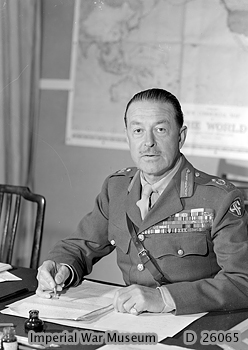![]() The Pacific War Online Encyclopedia
The Pacific War Online Encyclopedia
|
| Previous: Aleutian Islands | Table of Contents | Next: Algonquin Class, Coast Guard Cutters |

Imperial War
Museum. Via Wikipedia
Commons
Alexander was born in London, the third son of the 4th
Earl of Caledon. He was educated at Harrow and Sandhurst and served
with distinction with the Irish Guards during the First World War. He
rose to the rank of lieutenant colonel and commanded a battalion on the
Western Front. During the intervention in Russia, Alexander commanded the
Latvian militia. He then became commander of the Irish Guards and
served in both staff positions and as commander of a brigade in the Indian Army.
Commander of 1 Division when the European war broke
out, Alexander was one of the
youngest senior British
officers at age 49. He expertly led the rearguard
action at Dunkirk in
1940, and was
called upon to direct a similar desperate retreat during the Japanese
invasion of Burma
in 1942, when he was ordered to relieve Thomas J. Hutton as general
officer commanding Burma. He was possessed of great physical courage,
and had a reputation as a lucky officer, but the Burma campaign would
test his reputation for imperturbability and the ability to restore
desperate situations to its limit.
Alexander met with Archibald Wavell, commanding ABDA, in early March in Calcutta. Wavell's only orders to Alexander were to hold Rangoon, and Alexander received no further orders until 18 April. In the meanwhile it became clear to Alexander that holding Rangoon was no longer within the realm of the possible. He chose to ignore his orders and retreat into central Burma, but his forces were already heavily engaged and all but encircled near Pegu. Iida Shojiro expected the British to fall back on Rangoon, and this allowed Alexander to break out to the north before the Japanese discovered his intentions. 33 Division actually crossed the British line of march, but Sakurai Shozo was racing his division west to get around the presumed British flank, failed to cover the road north, and allowed the British to escape.
With Rangoon lost, Alexander knew that northern Burma could not be held and that the essential thing was to preserve his army to defend northeast India. The Japanese, meanwhile, rushed reinforcements to Rangoon for the pursuit. Alexander got some assistance from Chinese forces under Joseph Stilwell, and he proved capable of working with the prickly American officer; but Stilwell had little real command authority. While Chinese forces occasionally fought with great tenacity, Stilwell could not coordinate their movements, and his "command" was soon fragmented and forced to retreat back into China. Alexander, in turn, managed to get his forces to Imphal just in advance of the monsoon.
Alexander was ably assisted throughout the campaign by William Slim, who took command
of Burma Corps
at about the same time that Alexander took over as
GOC Burma.
Alexander was promoted to full general in April 1942
and was named as
commander in chief in the Middle East in August. He spent the
remainder of
the war in the Mediterranean theater, where he rose to the rank of
field
marshal. His subordinates here did not think him highly intelligent and
tended to ignore his orders when convenient to do so.
One senior general wrote of him years after the war that "I think he is
quite the least intelligent commander I have ever met in a high
position. I cannot imagine his ever producing a plan, let alone a good
plan. I don't think he ever did. Certainly in Italy I am sure he never
really took charge of operations. He had no tactical policty of
his own. Everything just drifted" (Allen 1984).
Alexander served postwar as governor general of Canada and was subsequently created 1st Earl Alexander of Tunis.
| 1891-12-10
|
Born at London, the third son of
the 4th Earl of Caledon |
|
| 1911 |
Graduates from Military Academy,
standing 85th in a class of 172, and joins the Irish Guards |
|
| 1918 |
|
Acting commander, 4 Guards
Brigade |
| 1919 |
Commander, Baltic Landwehr, Latvia |
|
| 1922 |
Colonel |
Commander, Irish Guards |
| 1926 |
Staff College, Camberley |
|
| 1928 |
Commander, Irish Guards |
|
| 1930 |
Imperial Defense College |
|
| 1934 |
Brigadier |
Commander, Nowshera Brigade,
Northwest India |
| 1937 |
Major
general |
|
| 1938 |
Commander, 1 Division |
|
| 1940-6 |
Commander, 1 Corps |
|
| 1940-11 |
Commander, Southern Command |
|
| 1940-12 |
Lieutenant
general |
|
| 1942-3-5 |
Commander, Burma Command |
|
| 1942-8-9 |
Commander, Near East Command |
|
| 1943-2-19 |
Commander, 18 Army Group |
|
| 1943-7-10 |
Commander, 15 Army Group |
|
| 1944-6-4 |
Field marshal |
|
| 1944-12-16 |
Supreme Allied Commander,
Mediterranean |
|
| 1946 |
Governor-General of Canada |
|
| 1952 |
Minister of Defense |
|
| 1954 |
Retires |
|
| 1969-6-16 |
Dies at Windsor |
References
Governor General of Canada (accessed 2007-4-24)
The Pacific War Online Encyclopedia © 2007, 2011 by Kent G. Budge. Index